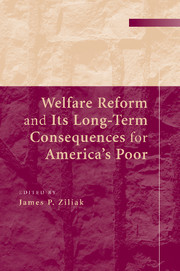Description
Welfare Reform and its Long-Term Consequences for America's Poor
Coordinator: Ziliak James P.
Leading poverty experts address the longer-term effects of the Personal Responsibility and Work Opportunity Reconciliation Act.
Language: English
Subject for Welfare Reform and its Long-Term Consequences for...:
Welfare Reform and its Long-Term Consequences for America's Poor
Publication date: 03-2015
Support: Print on demand
Publication date: 03-2015
Support: Print on demand
Welfare reform and its long term consequences for america's poor
Publication date: 08-2009
384 p. · 16x23.4 cm · Hardback
Publication date: 08-2009
384 p. · 16x23.4 cm · Hardback
Description
/li>Contents
/li>Biography
/li>
Two decades of federal and state-level demonstration projects and experiments concerning cash welfare in the United States culminated with the passage of the Personal Responsibility and Work Opportunity Reconciliation Act of 1996, better known as welfare reform. Ten years after reform there remain a host of unanswered questions on the well-being of low-income families. In Welfare Reform and its Long Term Consequences for America's Poor, many of the nation's leading poverty experts address these and related outcomes to assess the longer-term effects of welfare reform. A diverse array of survey and administrative data are brought to bear to examine the effects of welfare reform and the concomitant expansions of the Earned Income Tax Credit on the level and distribution of income, the composition of consumption, employment, public versus private health insurance coverage, health and education outcomes of children, marriage, and social service delivery.
1. What we know, what we don't know, and what we need to know about welfare reform Rebecca Blank; 2. Welfare reform and the level and composition of income Christopher Bollinger, Luis Gonzalez and James P. Ziliak; 3. How have expansions in the earned income tax credit affected family expenditures? Qin Gao, Neeraj Kaushal and Jane Waldfogel; 4. How families are doing nine years after welfare reform: 2005 evidence from the three-city study Bianca Frogner, Robert Moffitt and David Ribar; 5. The impact of welfare reform on leaver characteristics, employment and recidivism Peter R. Mueser, David W. Stevens and Kenneth R. Troske; 6. A re-examination of the impact of welfare reform on health insurance among less-skilled women John C. Ham, Xianghong Li and Lara Shore-Sheppard; 7. How welfare policies affect child and adolescent school performance: investigating pathways of influence with experimental data Pamela Morris, Lisa A. Gennetian, Greg J. Duncan and Aletha C. Huston; 8. The effects of welfare and child support policies on the incidence of marriage following a nonmarital birth Jean Knab, Irv Garfinkel, Sara McLanahan, Emily Moiduddin and Cynthia Osborne; 9. Welfare reform and health among the children of immigrants Ariel Kalil and Kathleen M. Ziol-Guest; 10. Mismatches and unmet need: access to social services in urban and rural America Scott W. Allard.
James P. Ziliak holds the Carol Martin Gatton Endowed Chair in Microeconomics in the Department of Economics at the University of Kentucky, and he is the Founding Director of the University of Kentucky Center for Poverty Research. He is a research affiliate with the National Poverty Center at the University of Michigan and with the Institute for Research on Poverty at the University of Wisconsin. Professor Ziliak received his Ph.D. in Economics from Indiana University in 1993. From 1993 to 2002 he served as assistant and associate professor of economics at the University of Oregon. He has held visiting positions at the Brookings Institution, University of Michigan, University of Wisconsin, and University College London. Professor Ziliak's research expertise is in the areas of labor economics, poverty policy, and tax policy. He has published in leading academic journals of economics, including the American Economic Review and the Journal of Political Economy. Most recently he co-edited the book Income Volatility and Food Assistance in the United States (2008).
© 2024 LAVOISIER S.A.S.
These books may interest you

Justice, Care, and the Welfare State 140.09 €



